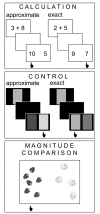Impaired neural networks for approximate calculation in dyscalculic children: a functional MRI study
- PMID: 16953876
- PMCID: PMC1574332
- DOI: 10.1186/1744-9081-2-31
Impaired neural networks for approximate calculation in dyscalculic children: a functional MRI study
Abstract
Background: Developmental dyscalculia (DD) is a specific learning disability affecting the acquisition of mathematical skills in children with otherwise normal general intelligence. The goal of the present study was to examine cerebral mechanisms underlying DD.
Methods: Eighteen children with DD aged 11.2 +/- 1.3 years and twenty age-matched typically achieving schoolchildren were investigated using functional magnetic resonance imaging (fMRI) during trials testing approximate and exact mathematical calculation, as well as magnitude comparison.
Results: Children with DD showed greater inter-individual variability and had weaker activation in almost the entire neuronal network for approximate calculation including the intraparietal sulcus, and the middle and inferior frontal gyrus of both hemispheres. In particular, the left intraparietal sulcus, the left inferior frontal gyrus and the right middle frontal gyrus seem to play crucial roles in correct approximate calculation, since brain activation correlated with accuracy rate in these regions. In contrast, no differences between groups could be found for exact calculation and magnitude comparison. In general, fMRI revealed similar parietal and prefrontal activation patterns in DD children compared to controls for all conditions.
Conclusion: In conclusion, there is evidence for a deficient recruitment of neural resources in children with DD when processing analog magnitudes of numbers.
Figures




References
-
- Temple CM. Procedural dyscalculia and number fact dyscalculia: Double dissociation in developmental dyscalculia. Cogn Neuropsychol. 1991;8:155–176.
-
- WHO . ICD-10. International Statistical Classification of Diseases and Related Health Problems 10th Revision; Chapter V: Mental and behavioral disorders (F81.2) Geneva, World Health Organization; 2005.
LinkOut - more resources
Full Text Sources
Other Literature Sources
Medical

